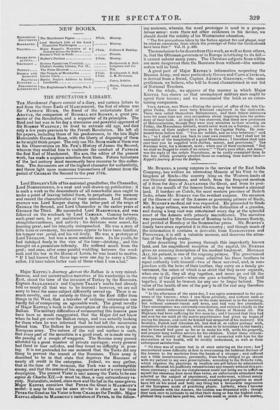Major KEPPEL'S Journey 4cross the Balkan is a very miscel-
laneous, and not uninstructive narrative of his wanderings in the East, about the time of the invasion of Turkey by the Russians. Captain ALEXANDER'S and Captain TRANT'S works had already told us nearly all that was to be learned : however, we are not sorry to have the same subject differently served up. There is so much novelty, and so entirely do things in the East differ from things in the West, that a traveller of ordinary information can hardly fail of composing an agreeable work. The great novelty of Major KEPPEL'S book is the description of the crossing of the Balkan. The military difficulties of surmounting this famous pass have been so much exaggerated, that the Major did not know when he had got over the Balkan range, and was actually looking for them when he was informed that he had left the mountains behind him. The Balkan he pronounces untenable, even by an European army. The nature of the soil and surface is such, that every part of the mountain is a good road, or is made one by the passing of a couple of waggons. The Russian army passed attended by a great number of private carriages : every general had thred or four caPches, and they found no difficulty in pass- ing. It is not pretended for one moment that the Turks did any thing to prevent the transit of the Russians. Their army is described to be in that state that deprives the Russians of nearly all credit in the enterprise. . Indeed, we may gather, that at the time of the invasion, the Turk was a contemptible enemy, and that the armies of his opponent are not of a very terrible description. The present Vizier is said among the Turks to be sine eOce de Charles X11.—it must be, then, te very extraordinary va- riety. Naturalists, indeed, class man and the bat in the same genus. Major KEPPEL considers that PETER the Great is MAIIMOUD'S model: it may be the one he aims at—he is about as far from PETER the Great as his Vizier is from CHARLES the Twelfth. Major Km's!. alludes to MAHMOUD'S imitation of PETER, in the follow- ing sentence, wherein the word prototype is used in a prepos- terous sense: were there not other evidences in his favour, we should doubt the solidity of his Westminster education.
"The few precautions taken by the Sultan against fire and plague, may be cited as omissions, from which the prototype of Peter the Great should have been free." Vol. II. p.400.
The conclusion to be drawn from this work, as well as from others, is, that the Ottoman government in Europe istottering to its fall— it cannot subsist many years. The Christian subjects from within are more dangerous than the Russians from without—the combi- nation will be fatal.
A great part of Major KEPPEL'S information respecting the Russian Army, and more particularly Greece and CAP° D'Israias, is derived from a friend, Captain ARTHUR GREGORY,—the same gentleman, we believe, who will be found characterized in our list of National Trustees.
On the whole, we approve of the manner in which Major KEPPEL has shown us that unemployed military men ought to spend their leisure ; and we recommend the book as an enter- taining companion.
Yous AFFAIR, NOT MINE.—During the period of office of the late Ca- pitan Pasha, there were forty Russians employed in the dockyards. These men called themselves Mahometans, and their fellow-labourers were for some time not very scrupulous about inquiring into the ortho- doxy of their faith. At length it was observed, that these new professors of Mahometanism, though they were very attentive to their worship on Friday, the Mussulman sabbath, would never work on a Sunday ; and in- formation of their neglect was given to the Capitan Pasha. He sum- moned them before him. "You are infidels, and no true believers," said he ; "so I shall send you back to your own country : but I shall not be unmindful of the hospitality of a good Mussulman ; I therefore shall take care that you be supplied with clothes, money, and provisions." The Russians were, for a moment, mute ; when one of them exclaimed, "But we shall be flogged to death if we return." "That's your affair, not mine,' was the reply of the sedate Mussulman, as he coolly consigned them to the fate which probably awaited them on reaching their native land.— Keppel's Journey Across the


























 Previous page
Previous page